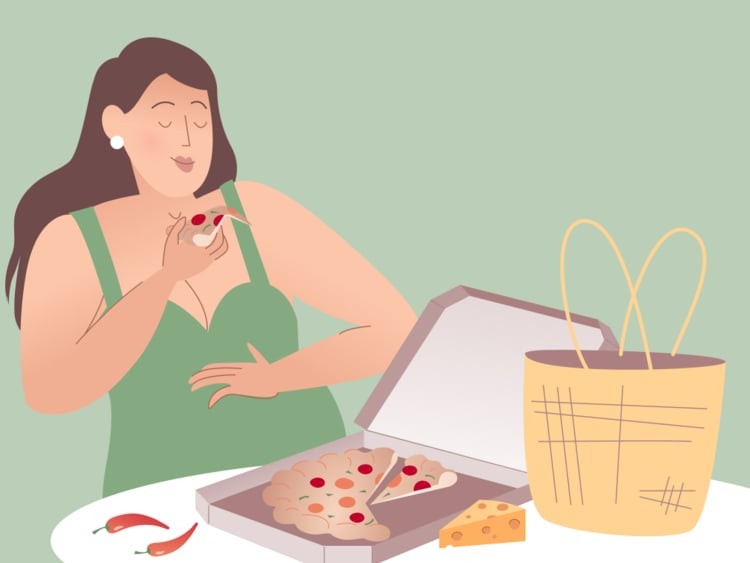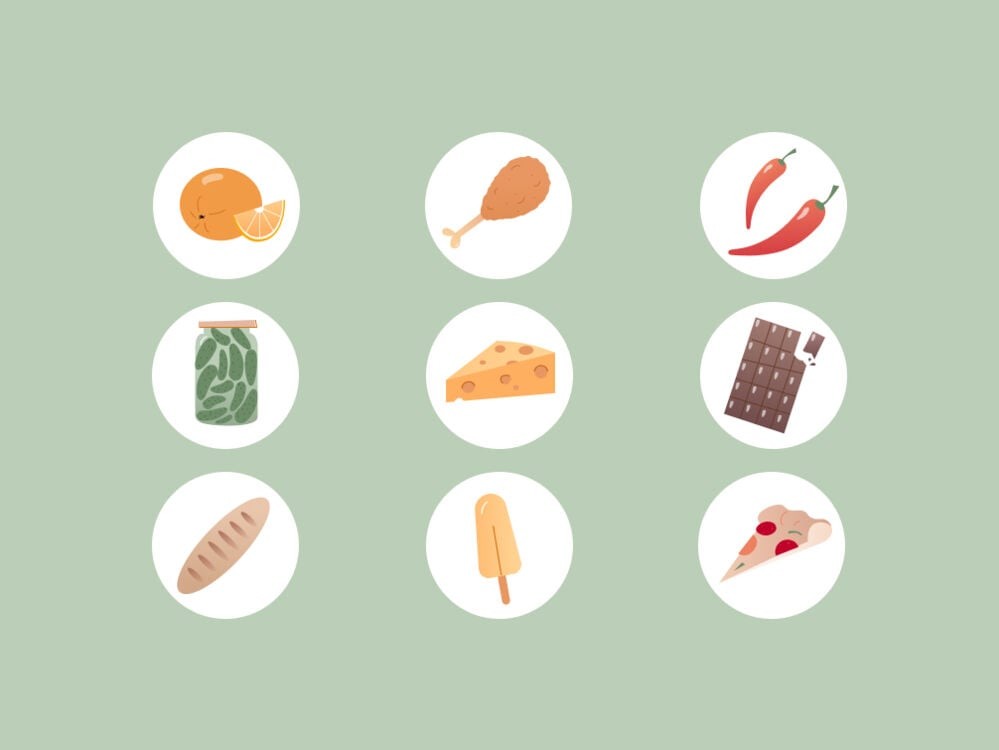Are you curious about “When Does A Pregnant Woman Start Craving Food?” The quest for answers ends here at FOODS.EDU.VN! Discover the timeline, causes, and the most craved foods during pregnancy, supported by expert insights and research. We will guide you through understanding these cravings and managing them effectively.
1. Understanding Pregnancy Cravings
What exactly constitutes a food craving during pregnancy?
A food craving is an intense desire to consume a specific food, making it difficult to resist. These cravings are a common experience, and understanding them is the first step in navigating this unique phase of life. Cravings are a very normal part of pregnancy. In fact, 50% to 90% of pregnant people in the United States experience cravings.
1.1. Are Cravings Unique to Pregnancy?
No, cravings aren’t exclusive to pregnancy. Studies indicate that a significant percentage of college-aged individuals also report experiencing food cravings. So, while pregnancy might amplify these desires, they are a common human phenomenon. Cravings during pregnancy are totally normal, but they should not be the sole indicator of nutritional needs in pregnancy.
2. When Do Pregnancy Cravings Typically Begin?
When can you expect these cravings to kick in?
Pregnancy cravings can start at any point during the pregnancy, but they tend to begin towards the end of the first trimester and intensify during the second trimester. Some women may experience cravings as early as five weeks into pregnancy.
2.1. The Role of Trimesters
Cravings can vary in intensity and type across the trimesters. Savory food cravings are strongest in the first trimester, while sweet food cravings are strongest in the second trimester, and cravings for salty foods are strongest in later pregnancy.
3. How Long Do Pregnancy Cravings Last?
When can you expect these cravings to subside?
Pregnancy cravings typically become less intense during the third trimester and tend to disappear after the birth of the baby. Knowing this timeline can help you mentally prepare for and manage these cravings.
4. What Causes Pregnancy Cravings?
The causes of food cravings during pregnancy are not fully understood. However, several theories attempt to explain this phenomenon:
- Hormonal Changes: Hormonal fluctuations during pregnancy may affect the senses of smell and taste, influencing food preferences and cravings.
- Nutrient Requirements: Some theories suggest that increased nutrient requirements or nutritional deficiencies could lead to cravings for certain foods. However, research is still lacking to fully support this hypothesis.
It’s important to remember that cravings should not be the only indicator of nutritional needs during pregnancy.
4.1. Unproven Theories
It’s important to note that the theories mentioned above are unproven. More research is needed to fully understand the causes of food cravings during pregnancy.
5. The Most Common Pregnancy Cravings
Which foods are most frequently craved during pregnancy?
Based on available data and clinical experience, here are nine common pregnancy cravings:
| Food Group | Examples | Health Considerations |
|---|---|---|
| Sweets | Chocolate, candy | Limit intake due to the risk of gestational diabetes and excessive weight gain. |
| Fruits | Citrus fruits, berries | Generally healthy; provides essential vitamins and minerals. |
| Carbohydrates | Bread, cereal, crackers | Opt for whole-grain varieties for more nutrients. |
| Fast Food | Pizza, chips | Indulge occasionally as part of a balanced diet. |
| Dairy | Milk, yogurt, cheese | Choose pasteurized options for calcium. |
| Spicy Foods | Curry, hot sauce | Avoid if experiencing heartburn or stomach issues. |
| Pickles | Pickled cucumbers, other vegetables | Be mindful of salt content to avoid water retention and high blood pressure. |
| Animal Protein | Steak, chicken | May indicate iron deficiency anemia; choose cooked options to avoid foodborne illnesses. |
| Cold Foods | Ice cream, popsicles | Enjoy in moderation; consider healthier alternatives like frozen yogurt or homemade smoothies. |


5.1. Sweet Cravings
Chocolate is the most common food craving in the United States for all individuals, whether they’re expecting or not. If you’re craving sweets during your pregnancy, it could be due to pregnancy food cravings, with chocolate and candy as two of the most commonly craved sweet foods.
While it’s OK to indulge your sweet cravings during pregnancy, it’s recommended that you don’t reach for sweets too often and that you only do so as part of a healthy diet. Research has found a link between increased intake of sugary foods and a risk of gestational diabetes, and excessive weight gain during pregnancy can be problematic.
If you’re worried about your cravings for sweet foods, you could try swapping candy and other sweet treats for fruit or substituting a few squares of milk chocolate for dark chocolate instead, as it’s considered a healthier alternative and contains heart-healthy flavonoids.
5.2. Fruit Cravings
If you have fruit cravings during pregnancy, then that’s great, as this is a delicious and healthy snack to enjoy throughout your pregnancy and beyond. If you’re craving fruit, you could try making a delicious fruit smoothie or grab an orange to satisfy your cravings. Citrus fruits contain vitamin C, and The American College of Obstetricians and Gynecologists’ (ACOG) general guidelines recommend that pregnant people over 19 consume 85 mg of vitamin C per day, or 80 mg per day if you’re younger than 19.
5.3. Carbohydrate Cravings
Pregnancy cravings for carbohydrates such as bread, cereal, and crackers are also common. If you find yourself craving these, Fiuza recommends opting for healthier, whole grain varieties that contain more nutrients, like fiber and vitamins, instead of processed varieties that may have added sugar, fats, and salt. As an added bonus, fiber can help to keep you full while also working to fight constipation, which is particularly common in the second trimester.
5.4. Fast Food Cravings
Does a gooey slice of pizza or a plate of salty, crispy chips sound particularly delicious right now? This could be due to pregnancy cravings, with both the aforementioned blog post study and Fiuza naming pizza and chips as two of the most commonly craved junk foods during pregnancy. As with sweets, it’s OK to indulge these cravings occasionally, but try to eat them as part of a healthy, balanced diet. You could also opt for a healthier alternative such as homemade sweet potato fries or go for a slice of pizza loaded with fiber and vitamin-rich vegetables.
5.5. Dairy Cravings
Dairy cravings during pregnancy, such as a craving for milk, are also common. The good news is that this is generally a healthy craving, too. This is because dairy products such as milk, yogurt, and cheese all contain calcium, a mineral that helps the fetus to develop healthy bones and teeth and helps to keep your own bones and teeth healthy and strong. ACOG’s general guidelines recommend that pregnant women aged 19 and older consume 1,000 mg of calcium per day or 1,300 mg per day for those aged 18 and under.
Just be sure to opt for dairy made with pasteurized milk and avoid any cheeses or foods that have been made with unpasteurized milk. These products may contain Listeria bacteria, which could lead to a potentially harmful infection. For more specific information on dairy products that you can and shouldn’t eat during pregnancy, you can read this article on planning a healthy pregnancy diet.
5.6. Spicy Food Cravings
If all you can think about is ordering the spiciest takeout you can find, then yes, you guessed it; you could be experiencing a pregnancy food craving. Spicy cravings in pregnancy are also normal, so if you suddenly find yourself wanting to order a spicy curry when previously your go-to was something milder, then don’t worry. It’s fine to indulge this craving, although you might want to steer clear of spicy foods if you’re experiencing heartburn or stomach issues (which are common during pregnancy), as there is evidence to suggest that they can aggravate these.
5.7. Pickle Cravings
Pickles are a classic pregnancy food craving, and again, it’s generally OK to indulge it. It is absolutely fine to satisfy your pickle craving, but be mindful of quantities, as too much salt can worsen water retention in pregnancy and increase the risk of gestational hypertension and preeclampsia, which may have negative health effects for your baby.
5.8. Animal Protein Cravings
Pregnancy cravings for animal protein, such as steak and chicken, are also normal, but they could be a sign that you are experiencing iron deficiency anemia, as these foods are rich in iron. Anemia is common during pregnancy, affecting between 20% and 80% of pregnant women. That’s often because iron needs increase during pregnancy, from 18 mg per day to 27 mg per day. If you suspect you may have anemia, speak with your health care provider about figuring out a solution.
It’s also worth noting that ACOG suggests avoiding all undercooked and raw meat, eggs, seafood, and poultry during pregnancy, as these could contain Salmonella, Campylobacter, and E. coli.
5.9. Cold Food Cravings
Do you have a sudden desire to eat cold and chilled foods? Pregnancy cravings for foods such as ice cream and popsicles are also normal, says Fiuza. As with sweets, it’s fine to indulge this craving, but try to do so as part of a healthy, balanced diet. You could also try an alternative option, such as frozen yogurt or a homemade fruit smoothie.
6. What Happens If You Ignore Pregnancy Cravings?
Is it harmful to ignore those intense cravings?
There is no evidence to suggest that ignoring pregnancy cravings could harm you or your baby, as long as you’re eating a healthy and balanced diet. However, if you’re concerned, it’s best to speak with your health care provider. In some cases, such as with sweets and fast food, it is generally best to indulge your cravings in moderation.
6.1. Pica: When Cravings Go Beyond Food
Some pregnant women might crave nonfood items such as soil, ice, clay, toothpaste, etc. This is known as pica and needs to be assessed by a health care professional, as consuming these can be harmful to both mom and baby. It’s worth noting that it may also be associated with a nutrient deficiency.
7. Pregnancy Cravings and the Baby’s Sex: Is There a Link?
You might have heard that the type of pregnancy cravings you have could be linked with the sex of your baby. Specifically, the unfounded theory is that if you’re experiencing cravings for salty foods, then you’re having a boy, and if you’re experiencing cravings for sweet foods, then you’re having a girl. However, there is no evidence to suggest that pregnancy food cravings are linked to the sex of your baby. Similar to the pendulum test, it’s a fun (but nonscientific) way of trying to guess the sex of your unborn child.
8. What If You Experience No Pregnancy Cravings?
Is it normal to have no cravings at all?
If you’ve experienced no cravings during your pregnancy, then don’t panic; this is also normal, and there’s no need to worry. We know that anywhere between 50% and 90% of pregnant people in the United States will experience food cravings, but that also means that between 10% and 50% of pregnant people will not experience food cravings. Remember that every pregnancy is different, and if you have any concerns, your health care provider should be able to provide you with tailored advice just for you.
9. Advice for Managing Pregnancy Cravings
How can you maintain a healthy diet while managing cravings?
Here’s some advice on sticking to a healthy diet while managing pregnancy food cravings:
- Eat a varied and balanced diet including plenty of fruit and vegetables, whole grains, legumes, nuts and seeds, some lean protein such as turkey, chicken, and fish, and dairy such as pasteurized yogurt.
- Eat regular meals including lean protein and fiber, which can help you feel full and may decrease other cravings. You could also consider having one to two healthy snacks a day to avoid fluctuations in blood sugar, which could trigger cravings. Some ideas for healthy snacks include Greek yogurt with fruit, a handful of nuts, whole grain crackers with cheddar cheese, and raw veggies with hummus.
- Include regular physical activity in your daily routine (unless your health care provider has advised you not to).
- Be mindful of how much and how often you eat foods that are high in sugar or fat and try to make healthy swaps whenever possible. For example, you could have a homemade fruit popsicle or frozen yogurt instead of ice cream if you crave something cold and sweet. Or try a couple of squares of dark chocolate instead of a whole bar of milk chocolate.
- Avoid any foods that can carry a risk for your health or the health of your baby. These include raw and undercooked meat, eggs, and seafood; unpasteurized dairy; alcohol; and excessive amounts of caffeine.
9.1. Mindful Eating
While there is no need to be overly strict with food intake, it is important to try and be mindful of portion sizes and make healthier choices whenever possible. Food cravings during pregnancy can alter dietary intake, which can potentially contribute to excess weight gain, particularly if the foods craved are high in sugar or high in fat. We know that gaining too much weight during pregnancy isn’t healthy for both mom and baby. Your health care provider will be able to advise how much weight you should ideally gain during your pregnancy, as this varies for everyone and is dependent on factors including your prepregnancy weight, body mass index, and how many babies you are carrying.
10. Conclusion
Pregnancy food cravings are incredibly common. Equally, there’s no need to worry if you don’t experience any cravings at all, and they’re not associated with excessive gestational weight gain, maternal glycemia, or offspring outcome measurements. For those who do experience pregnancy cravings, they’re likely to kick in in the first trimester, sometimes as early as five weeks. They can then get stronger in the second trimester before slowly coming to an end during the third trimester.
10.1. Enjoy Your Pregnancy
Most importantly, enjoy your pregnancy, and if you have any questions or concerns, always speak to your health care provider.
FAQ: Decoding Pregnancy Cravings
Here are some frequently asked questions about pregnancy cravings:
- Is it normal to crave non-food items during pregnancy?
- Craving non-food items, known as pica, is not normal and should be evaluated by a healthcare professional.
- Can pregnancy cravings indicate a nutritional deficiency?
- Sometimes, but not always. It’s important to maintain a balanced diet regardless of cravings.
- Are there any ways to prevent pregnancy cravings?
- Unfortunately, there’s no known way to prevent them, but you can manage them with healthy eating habits.
- Is it okay to give in to every pregnancy craving?
- Moderation is key. Occasional indulgences are fine, but focus on a balanced diet.
- Do cravings differ between pregnancies?
- Yes, every pregnancy is unique, and cravings can vary significantly.
- Are pregnancy cravings psychological or physical?
- They likely involve a combination of both hormonal and psychological factors.
- Can cravings be a sign of underlying health issues?
- Unusual cravings, like pica, can sometimes indicate a health problem, so it’s best to consult a doctor.
- Do all women experience pregnancy cravings?
- No, some women don’t experience any significant cravings during pregnancy.
- How can I manage cravings for unhealthy foods?
- Try healthier alternatives or allow yourself small portions in moderation.
- Are food aversions related to cravings during pregnancy?
- Yes, food aversions and cravings often occur together during pregnancy.
Explore Further with FOODS.EDU.VN
Eager to dive deeper into the world of pregnancy nutrition and healthy eating?
Looking for Reliable Recipes and Expert Advice?
At FOODS.EDU.VN, we understand the unique challenges pregnant women face when navigating their diets. Our website is dedicated to providing you with easy-to-follow recipes, expert advice, and in-depth knowledge about ingredients and cooking techniques.
Why Choose FOODS.EDU.VN?
- Detailed and Easy Recipes: Our recipes are designed for home cooks of all skill levels.
- Expert Insights: We offer a wealth of information on ingredients, cooking techniques, and nutritional facts.
- Diverse Culinary Exploration: Discover exciting dishes from various cultures.
- Personalized Adjustments: Learn how to adapt recipes to your taste and dietary needs.
- Comprehensive Culinary Knowledge: Access detailed information about ingredients, cooking techniques, and the history of different cuisines.
Ready to embark on a culinary journey that caters to your pregnancy needs?
Visit FOODS.EDU.VN today and explore a world of delicious and nutritious recipes. Whether you’re seeking simple meal ideas, craving something exotic, or need expert guidance, we’ve got you covered.
Contact Us:
- Address: 1946 Campus Dr, Hyde Park, NY 12538, United States
- WhatsApp: +1 845-452-9600
- Website: FOODS.EDU.VN
Don’t let pregnancy cravings overwhelm you. Let foods.edu.vn be your trusted guide to a healthy and enjoyable pregnancy diet.
